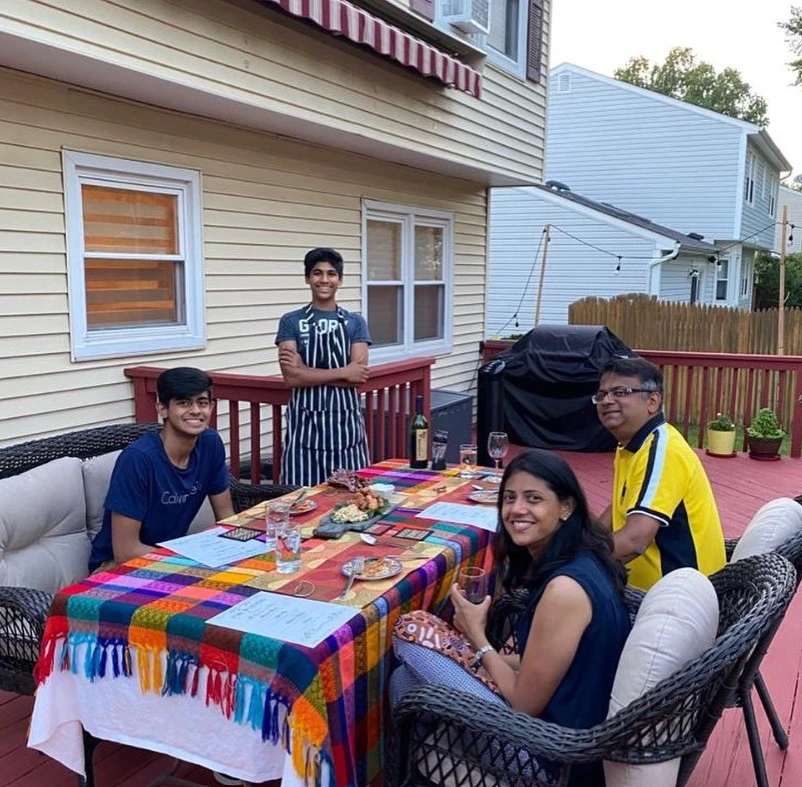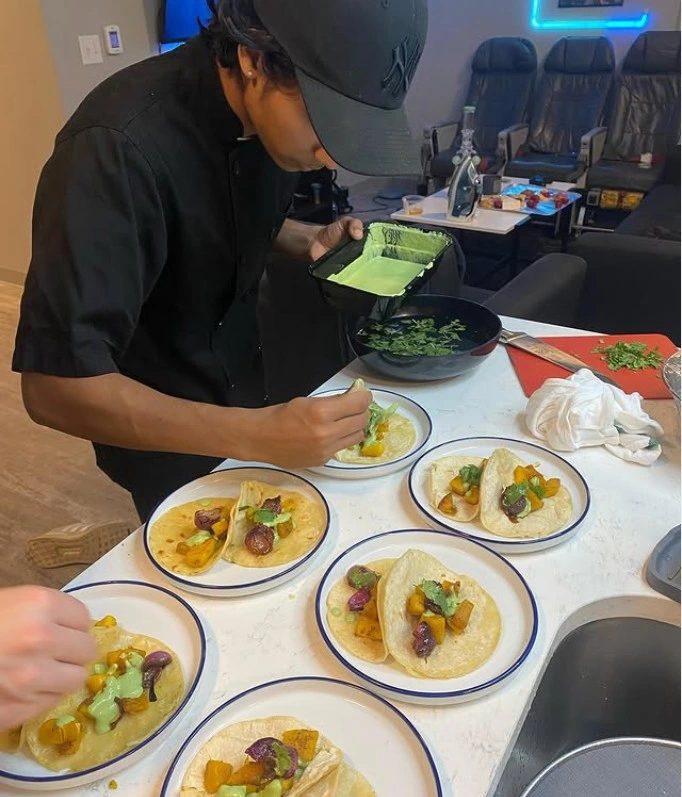(Jun 23, 2025) With a background that already spans a self-published cookbook, a home-based-restaurant, a university pop-up venture, reality TV, and private chef gigs for elite athletes, 20-year-old Arnav Kamulkar is far ahead of most aspiring chefs his age.
In the first half of 2025, Arnav took his passion to a new level. He competed on Season 4 of Next Level Chef, the high-stakes Fox reality series participating in the celebrity Gordon Ramsay team, where rising culinary talents are challenged to create gourmet dishes under pressure in three dramatically different kitchen environments. Arnav, about to pass out from Cornell University’s Nolan School of Hotel Administration, joined Ramsay’s team after impressing the celebrity chef with his “energy, attitude, and absolute focus.”
Over the course of the season, Arnav cooked standout dishes but finished seventh out of 24 contestants. However holding his own against seasoned professionals, home cooks, and social media food stars, marked a milestone in his life. For Arnav, it was an unforgettable ride. “It was a surreal experience,” he told Cornellians, a Cornell University publication. “My biggest takeaway was learning how to be more creative with food because you don’t have time to go through cookbooks for inspiration when you have 30 seconds to frantically grab ingredients and then develop a dish.”
View this post on Instagram
Next Level Chef
The Next Level Chef Season 4 aired from February 13 to May 15, 2025, featured 24 contestants, later narrowed to 15 after auditions, and divided into teams mentored by celebrity chefs and television personalities Gordon Ramsay, Nyesha Arrington, and Richard Blais. The competition was fierce, with chefs from three distinct backgrounds: professionals, home cooks, and social media culinary stars. Each week, they faced high-pressure challenges in three vertically stacked kitchens—top-tier, mid-level, and a bare-bones basement setup, designed to test their adaptability and creativity.
Arnav Kamulkar who participated in the home-cook category, stood out early on Ramsay’s team. He consistently delivered strong performances, and his elimination wasn’t due to a major misstep but rather the cumulative pressure and rising competition. Still, finishing seventh out of 24, especially as one of the youngest and least professionally trained contestants was a remarkable feat.
The season ultimately crowned professional chef Austin Beckett as the winner, with Beatrice Heirigs and Megan Keno as runners-up. But for Arnav, the experience was less about the trophy and more about proving he could thrive in a high-stakes culinary arena.
Though Ramsay is known for his fiery TV persona, Arnav discovered a more nuanced side to the chef. “He was very sweet. There’s a lot more to him than what you see on TV—though I did get yelled at a bit, too,” he laughed. “He always expected the best from us, and would help us if we messed up.”
View this post on Instagram
From Edison’s kitchen to national stage
The moment on national television was a pinnacle in a culinary journey that began much earlier. Arnav’s love for food was sparked in childhood in Edison, New Jersey, where he started cooking at the age of six. His earliest memories were shaped by the smells and sounds of his mother preparing traditional Indian dishes. As she began experimenting with global cuisines, he followed suit, eager to learn and experiment.
“Originally, I was just helping my mom cook vegetables and watching her cook,” he recalled. “Then slowly I wanted to make my own recipes, and do my own stuff. And that’s how it kind of led to what I’m doing today.”
That passion only grew stronger in high school. Encouraged by his parents, he turned their home into a weekend pop-up restaurant called Fork in the Road, offering six-course international meals to friends and family. His mother became his sous chef, his father the server, and the experience quickly gained traction. “It taught me and my parents that I loved doing this, because I spent every second of my time on it,” he said.
At 16, he self-published Chef Arnav’s Signature Guide to Gourmet Cooking, a cookbook featuring a selection of globally inspired dishes including shrimp tacos, chicken bao buns, palak khichdi, and a creative take on tiramisu. Not only did Arnav love cooking but he was determined to share his food with the world.

Arnav Kamulkar at his home-based-restaurant with guests
Finding his people at Cornell
When Arnav Kamulkar joined the Nolan School of Hotel Administration at Cornell, he found a vibrant community that matched his passion for the culinary arts. During his first year, he joined the culinary team for Hotel Ezra Cornell, a student-run hospitality showcase. But he soon realized he wanted more hands-on involvement with cooking.
So he created CENA, a pop-up restaurant concept that he launched from the third floor of a house in Collegetown. CENA was inspired by his upbringing. His parents are musicians, and he wanted his restaurant to be an experience, not just a meal. Each menu was paired with a custom playlist, designed to match the tone and flavour of the food.
The idea quickly caught on. Arnav adapted the model to allow diners to book private events where he could prepare food in their kitchens or at alternative locations. Behind the scenes, a small team of supportive friends—Dylan Beegal, Alex Zoneraich, and Dylan Drongesen helped with logistics, cooking, and grocery runs. Their belief in Arnav’s vision proved vital.
One guest, a music enthusiast, once told him, “If there ever was a song for this food, it would be this.” For Arnav, the compliment was deeply meaningful. “When people compliment my food, I love it, but the fact that someone who is a music aficionado was genuinely blown away from the thought put into the music, really solidified my mission.”


Arnav at work at CENA
From pop-up to business plan
While Arnav had strong instincts in the kitchen, he knew running a restaurant required more than culinary talent. As a student at the Hotel School, he enrolled in courses focused on food and beverage management, entrepreneurship, and hospitality operations.
“In terms of actually running a restaurant, I never put in thought into what my food cost (was), what my overhead (was), where I (had) to invest,” he said. “So, being in a class like Principles of Food and Beverage Operations Management, I know my food cost should only be 25 percent of what I’m charging. These classes helped me think more about the feasibility (of running a restaurant),” he remarked.
As a student the youngster also attended seminars through the Pillsbury Institute for Hospitality Entrepreneurship, where he gained insights from entrepreneurs and industry leaders. These experiences helped him refine CENA’s structure and address the practical challenges of running a mobile restaurant. Originally, he wanted the pop-up to operate from one apartment, but logistical issues forced him to pivot. “I knew what I was getting into. The biggest thing about managing my expectations was to adapt,” he explained.
View this post on Instagram
Cooking for the pros
Following his time on Next Level Chef, Arnav was offered new opportunities thanks to the exposure and connections he gained. He helped cook for a VIP event at a NASCAR race and spent several weeks working as a private chef for four NFL players during their offseason training.
“I was under a lot of pressure,” he said, “but that’s where I shine.”
These experiences gave Arnav a taste of the high expectations that come with professional kitchens and elite clientele, an important training ground for someone who dreams of running his own fine-dining establishment.
View this post on Instagram
Eyes on the future
As of summer 2025, the youngster is interning as a dining room manager at a bistro in New York City. It’s a step toward understanding front-of-house operations, analytics, and people management which are core elements in the toolkit of any future restaurateur.
“My dream is to open my own restaurant,” he said. “And I will keep taking life one step at a time until I figure it out.” For Arnav Kamulkar, every dish is more than a recipe, it’s a narrative. And the young chef’s story is only just getting started.




